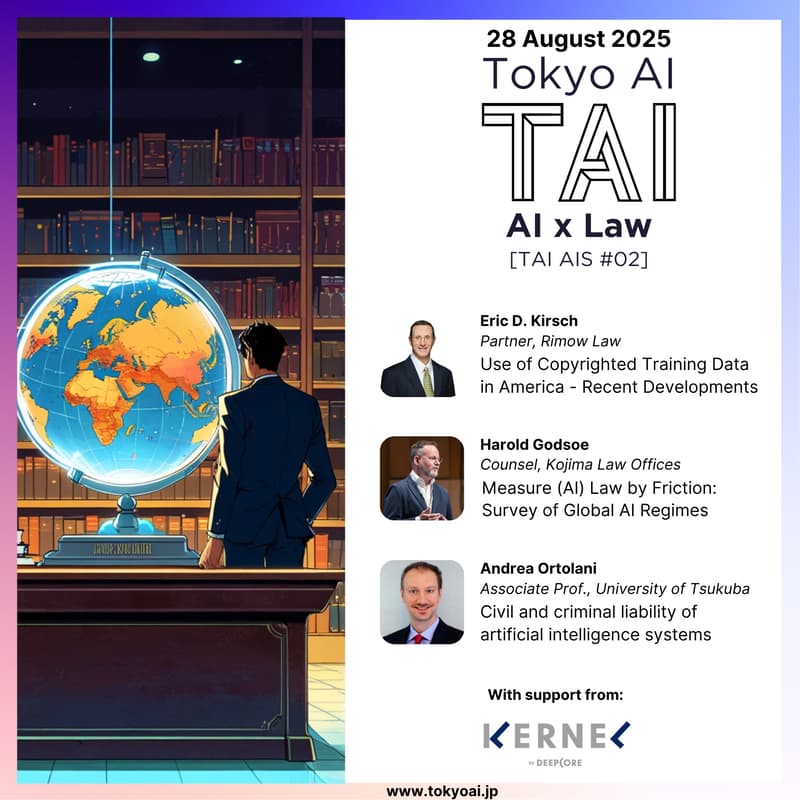

AI × Law: Global Perspectives on Copyright, Regulation, and Liability
Tokyo AI (TAI) presents the next session of the AI in Society (AIS) group, this time on the legal aspects of AI.
Artificial Intelligence is transforming industries, and the law is racing to keep up. Join us for an in-depth exploration of three of the most pressing legal issues shaping the AI landscape:
Copyrighted training data and fair use defenses in recent landmark U.S. court decisions.
Comparative AI regulatory regimes across the U.S., EU, and Japan, measured by their real-world “friction” for industry.
Civil and criminal liability of AI systems, examined through history and the provocative lens of slave law.
Speakers:
Eric D. Kirsch (Partner, Rimon Law, Tokyo Office) — Intellectual property expert with decades of global legal experience.
Harold Godsoe (Counsel, Kojima Law Offices) — Specialist in AI regulation and cross-border compliance.
Andrea Ortolani (Associate Professor of Law, University of Tsukuba) — Comparative law scholar with a focus on legal evolution.
This event brings together leading legal minds from practice and academia to clarify the stakes, frameworks, and future trajectories of AI law. Lawyers, policymakers, entrepreneurs, researchers, and anyone navigating the AI ecosystem will leave with fresh insights and practical takeaways.
Agenda
18:00 Doors open
18:30 - 19:00 Use of Copyrighted Training Data in America - Recent Developments (Eric D. Kirsch)
19:00 - 19:30 Measure (AI) Law by Friction: Survey of Global AI Regimes (Harold Godsoe)
19:30 - 20:00 Civil and Criminal Liability of AI Systems: Hints from History (Andrea Ortolani)
20:00 - 21:00 Networking
21:00 Doors close
Speakers:
Talk 1 - Use of Copyrighted Training Data in America - Recent Developments
Speaker: Eric D. Kirsch (Partner, Rimow Law)
Abstract: This presentation will discuss 2 recent court decisions concerning Anthropic and Meta’s use of copyrighted training data and their reliance on the fair use defense to copyright infringement. This presentation will explain these 2 decisions, copyright infringement, the fair use defense, and what these decisions mean for AI startups.
Bio: Eric received a B.S. degree in Electrical Engineering from Johns Hopkins University and a J.D. degree from the University of Pittsburgh School of Law, where he was a Notes and Comments Editor of the Law Review. After law school, Eric became a prosecutor with the Habitual Offender Unit of the Philadelphia District Attorney’s Office. Eric then transitioned to Intellectual Property Law and became a partner with an IP Boutique law firm in New York City. In 2010, Eric moved to Japan to become Chief IP Counsel for Nikon Corporation, a position he held for over 10 years. Eighteen months ago, Eric joined Rimon as a partner and opened Rimon’s Tokyo Office.
Talk 2 - Measure (AI) Law by Friction: Survey of Global AI Regimes
Speaker: Harold Godsoe (Counsel, Kojima Law Offices)
Abstract: This talk compares national AI-regulation regimes by how hard they actually make actions for AI-related industries. Actions include frontier-model development and copyright risks related to training data; public-facing generative services; high-risk deployments; synthetic media/biometrics; and government use and adoption. I’ll explain and apply levels of friction to several national strategies, including Japan’s AI Promotion Act (2025), the EU AI Act (2025), and America’s AI Action Plan (2025).
Bio: Harold Godsoe is Counsel at Kojima Law Offices in Tokyo, where he focuses on AI × Law and helps multinational clients navigate Japan’s business and regulatory landscape. He studied Artificial Intelligence and Philosophy of Mind and Ethics at the turn of the millennium, and then worked in international education programs in Tunisia and Sri Lanka, and completed law school at the University of Western Ontario, where he was Editor-in-Chief of the Law Review. He later earned a master’s in international trade at Washington College of Law in Washington, DC, where he taught briefly. Before joining Kojima Law in 2017, he worked on trade, IP, and special-governance matters involving SEZs while at Kalik Lewin (DC). Harold now chairs the AI practice group for the Mackrell International legal network, supporting thousands of lawyers on AI adoption and policy.
Talk 3 - Civil and Criminal Liability of AI Systems: Hints from History
Speaker: Andrea Ortolani (Associate Professor, University of Tsukuba)
Abstract: This presentation will first provide an overview of the main legal issues concerning civil and criminal liability rules for AI systems. Historically, a body of liability rules existed for subjects possessing intelligence and autonomy yet remaining subordinate to other persons: slave law. This presentation will then explore whether such historical legal constructs may inform contemporary liability regimes for AI systems.
Bio: Andrea Ortolani is an associate professor of law at the University of Tsukuba. He completed his undergraduate and graduate studies in Italy and Japan.
He has conducted research on the reception of Western law in Japan and on various aspects of the Japanese legal system: constitutional, civil, and criminal law. Among his current interests are law in everyday contexts and theoretical aspects of legal evolution.
Tokyo AI (TAI) information
TAI is the biggest AI community in Japan, with 2,400+ members mainly based in Tokyo (engineers, researchers, investors, product managers, and corporate innovation managers).
Web: https://www.tokyoai.jp/
DEEPCORE information
DEEPCORE is a VC firm supporting AI Salon Tokyo. They operate a fund for seed and early-stage startups and KERNEL, a community supporting early entrepreneurs.